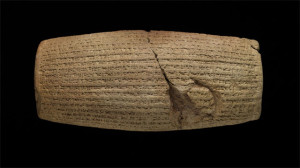The Cyrus Cylinder, reputedly the oldest known declaration of human rights, went on view at the Asian Art Museum last Friday, August 9, 2013. It is a cylinder made of clay, tapered at both ends, and inscribed with Babylonian cuneiform script, one of the world’s oldest known systems of writing.
British archaeologists discovered the cylinder in 1879 as they excavated a wall of the ancient city of Babylon. They were looking for, among other things, evidence of the stories told in the Bible and by Greek historians. What they found was basically a political broadside from Persian King Cyrus the Great justifying his conquest of Babylon in 539 BCE.
“According to the cylinder and the Bible,” says Qamar Adamjee, Associate Curator for South Asian Studies at the Asian Art Museum in San Francisco, “Babylon was conquered by Cyrus without any fight.” True or not, the cylinder claims the Babylonians had neglected their chief god, Marduk. “And then,” Adamjee says, “it goes on to talk about how Marduk invites Cyrus to come to Babylon and to bring back the appropriate divine cults.”
Adamjee says the key phrase that has given the cylinder its status as a symbol of human rights is where Cyrus states what he intends for the peoples the Babylonians had conquered and taken into exile in Babylon. “He allows them to return to their homelands, taking with them objects of their worship that had been confiscated.” Among these groups were the Israelites, who recorded the fall of Babylon in the book of Daniel; and their return to Jerusalem, and the rebuilding of the Temple under Cyrus’ rule in Chronicles and the book of Ezra. Not, Adamjee notes, that the cylinder’s text mentions the Israelites, or any other displaced people by name.

The Cyrus Cylinder, 539-538 BCE. Iraq, Achaemenid period (550-330 BCE). c. Trustees of the British Museum.
In the late 1960s, the Shah of Iran dubbed the Cyrus Cylinder “the world’s first charter of human rights,” ironic since the Shah was also famous for his use of secret police and torture to control his country. Still the cylinder’s U.S. tour (it arrives in San Francisco from the Metropolitan Museum in New York City) has inspired the interest of many Iranian Americans. Bita Daryabari is co-sponsoring the cylinder exhibit at the Asian. Daryabari founded the PARS Equality Center, based in Menlo Park and San Jose. PARS provides social and legal services to the Iranian American Community around the world and Darayabi held the cylinder in her hands during a visit to the British Museum in 2006.


